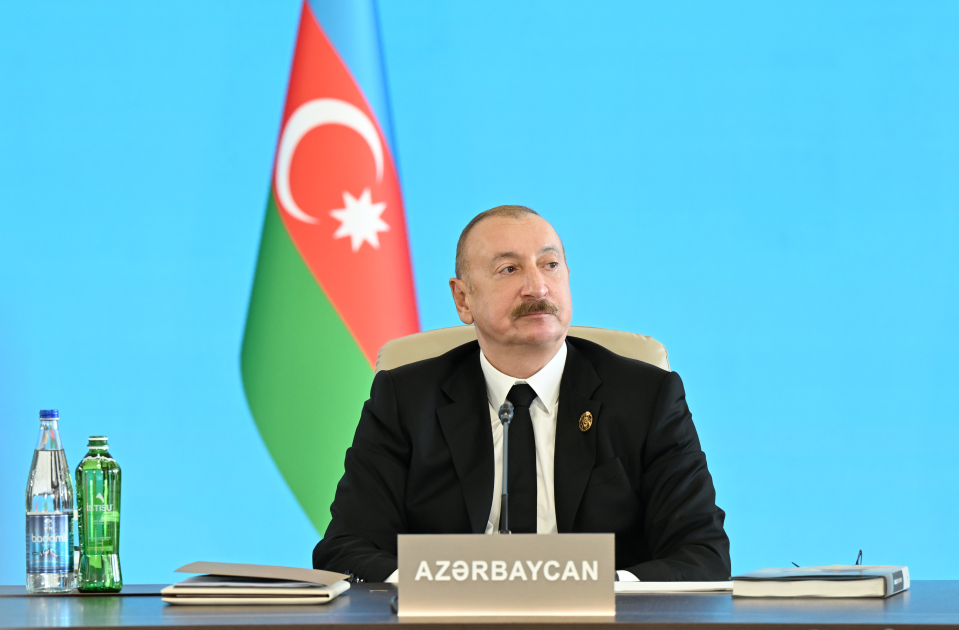By Laman Zeynalova
Copyright trend

BAKU, Azerbaijan, October 9. Since gaining
independence, all post-Soviet states began under nearly the same
conditions – shattered economies, instability, and uncertainty. Yet
only a few managed to turn those challenges into opportunities.
Azerbaijan stands out as one such example – a country that, despite
war, occupation, and the displacement of over a million refugees
and internally displaced persons, has achieved remarkable progress
and become one of the region’s most successful nations. This
transformation is the result of the strategic and visionary
leadership of President Ilham Aliyev.
Azerbaijan has not only strengthened its military capabilities
and liberated its occupied territories but has also successfully
reintegrated them into the national economy. Peace in the South
Caucasus today brings benefits far beyond the region itself:
Azerbaijan has secured stability at home while reshaping the
political and economic landscape across the region – opening up new
opportunities for investment, trade, and prosperity. Immediately
after the Victory, Azerbaijan took the initiative in launching a
peace process based on respect for sovereignty and territorial
integrity. The Washington meeting on August 8 of this year marked a
milestone for peaceful settlement, reflecting Azerbaijan’s
diplomatic maturity and the strategic leadership of President Ilham
Azerbaijan’s international success is backed not only by
diplomatic achievements but also by strong economic performance.
Recent decisions by major credit rating agencies have sent a clear
signal of the country’s economic resilience.
Moody’s upgraded Azerbaijan’s sovereign credit rating from Ba1
to investment grade Baa3, highlighting the country’s progress in
transforming itself into a transport and energy hub that supports
growth in non-oil sectors such as logistics, construction, and
tourism. A major factor in this transformation is the development
of the liberated territories of Karabakh and East Zangezur, which
is accelerating economic diversification and demonstrating how
peace and stability directly enhance Azerbaijan’s investment
Fitch Ratings has also affirmed Azerbaijan’s long-term issuer
default rating at “BBB–” with a stable outlook, noting reduced
currency risks. Meanwhile, unemployment has fallen to a historic
low of 5%, a clear reflection of effective economic management and
job creation.
The energy sector remains the flagship of Azerbaijan’s economy.
The country now exports natural gas to 14 nations, maintaining a
leading global position in pipeline gas supplies. At the same time,
Azerbaijan is expanding its renewable energy sector, aiming to
generate around 40% of its total electricity from renewables by
2030. This approach not only reduces environmental risks but also
strengthens Azerbaijan’s position as an attractive partner for
international investment in clean energy.
The country’s strategic location and advanced transport
infrastructure further enhance its economic potential. Azerbaijan
has become a key transit hub linking East and West, North and
South. Freight volumes along the Middle Corridor have surged by
almost 90% since 2022, while the Caspian’s largest merchant fleet –
with an annual capacity of up to 25 million tons – together with
nine international airports and the Baku–Tbilisi–Kars railway,
ensures uninterrupted logistics flows. These assets make Azerbaijan
an indispensable link in global trade and transport networks,
creating new opportunities for business and investors.
Azerbaijan’s economic momentum is therefore more than just a set
of numbers – it reflects the reintegration of peaceful territories,
the strengthening of energy independence, and the creation of a
world-class logistics hub. The country has become a model of
post-Soviet success and an increasingly attractive platform for
international cooperation.
Azerbaijan is also deepening cooperation with CIS countries in
Central Asia, evolving into a key economic and transport center for
the wider region. This direction is part of a long-term strategy
that views these countries not only as strategic partners but also
as an essential link in building a shared space of stability,
energy cooperation, and transport integration – stretching from the
Caspian to Europe.
For Baku, this region is not just about markets or transit
corridors. It is a space of shared history, cultural ties, and
common challenges – a foundation for lasting economic partnership.
Under the personal leadership of President Ilham Aliyev, joint
initiatives have moved from declarations to concrete projects with
tangible economic results.
Partnership with Uzbekistan is growing particularly rapidly. It
now covers industry, the digital economy, green energy, and
education. Joint industrial ventures, transport and logistics
projects along the Middle Corridor, dual-degree programs, and
research cooperation provide a solid foundation for deeper
integration. The results are already visible: the number of
Azerbaijani companies operating in Uzbekistan rose from 178 in 2019
to 278 by April 2025, while trade continues to expand in sectors
such as agribusiness, textiles, petrochemicals, and
engineering.
Cooperation with Turkmenistan is also developing swiftly, driven
primarily by the energy sector. In parallel, projects in transport,
logistics, and cultural exchange are reinforcing bilateral ties and
making them more sustainable.
Regional meetings – such as the trilateral summit in
Turkmenbashi on August 22, 2025 – have reaffirmed the strategic
importance of transport, energy, and humanitarian initiatives.
Memoranda on international air services, transport and logistics
cooperation, and cultural exchange were signed, reflecting
Azerbaijan’s comprehensive approach to regional integration.
Under the leadership of President Ilham Aliyev, Azerbaijan is
not only strengthening and diversifying its own economy but is also
shaping a new economic reality across the CIS. The country is
emerging as a key energy and transit hub for Eurasia, opening fresh
opportunities for investment, trade, and sustainable growth across
the region.
Azerbaijan’s story is a vivid example of how a nation that has
endured war, occupation, and major challenges can become a driver
of economic growth, an energy leader, a transport hub, and a
reliable regional partner. The strategic leadership of President
Ilham Aliyev has turned the country’s geopolitical position into a
powerful tool for influence and sustainable development.
Today, Azerbaijan is not just a successful state but a model for
the CIS – with a strong economy, resilient sovereignty, a clear
foreign policy vision, and a growing role in the global system.